Unit8 Detective stories课件(共33张PPT) 牛津译林版九年级英语上册
文档属性
| 名称 | Unit8 Detective stories课件(共33张PPT) 牛津译林版九年级英语上册 |

|
|
| 格式 | pptx | ||
| 文件大小 | 6.3MB | ||
| 资源类型 | 教案 | ||
| 版本资源 | 牛津译林版 | ||
| 科目 | 英语 | ||
| 更新时间 | 2025-02-03 00:00:00 | ||
图片预览

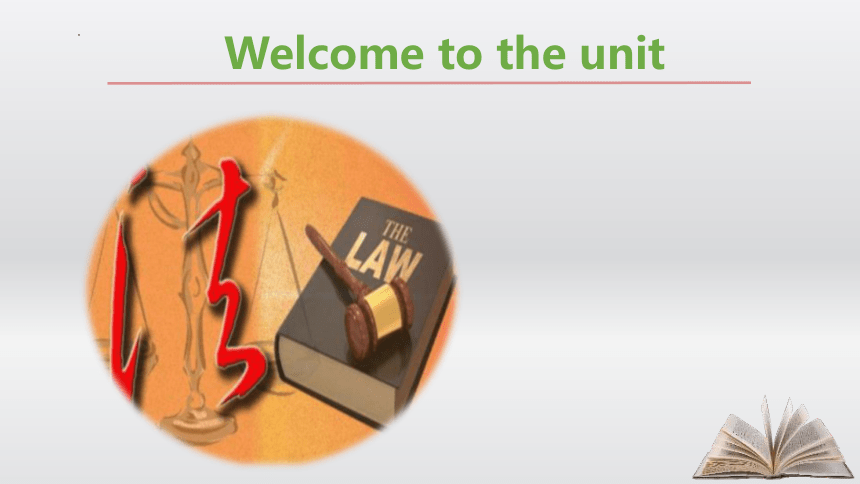
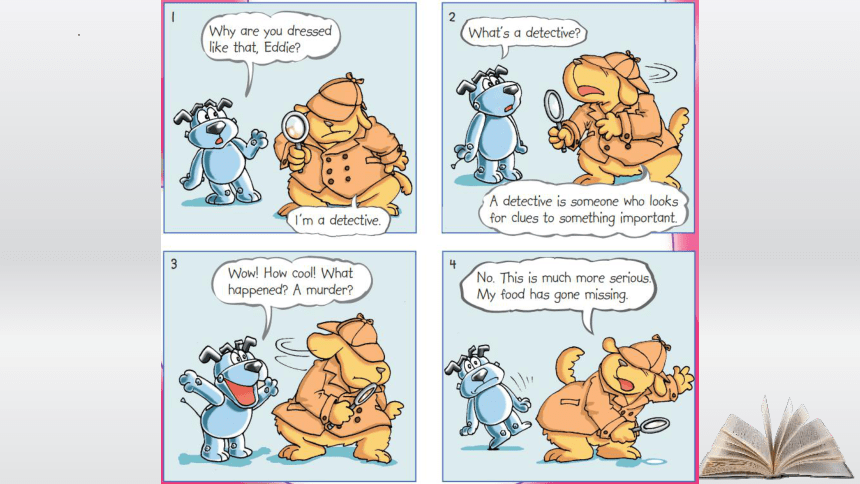
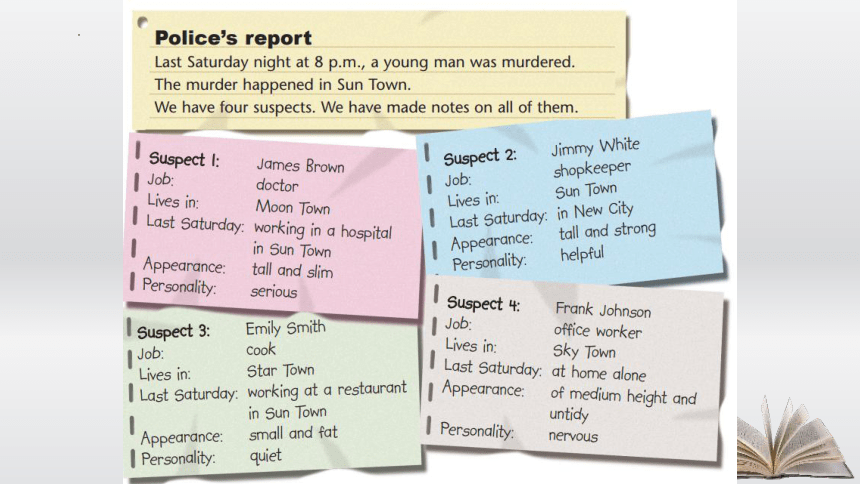
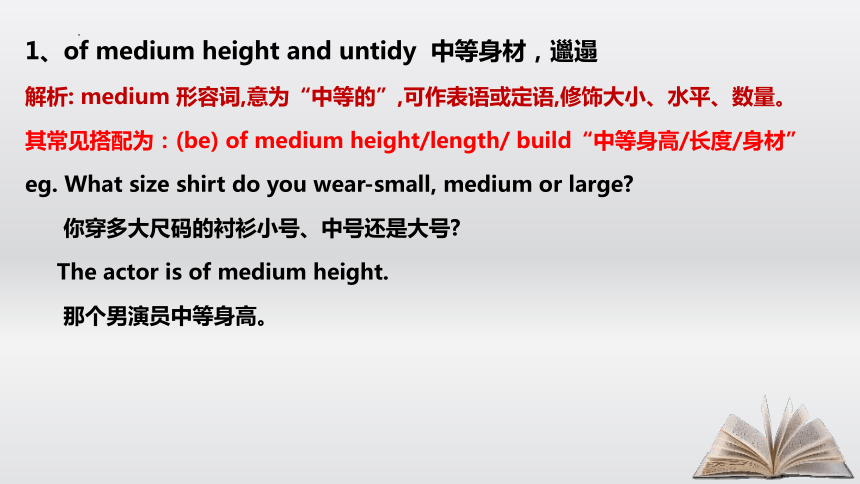

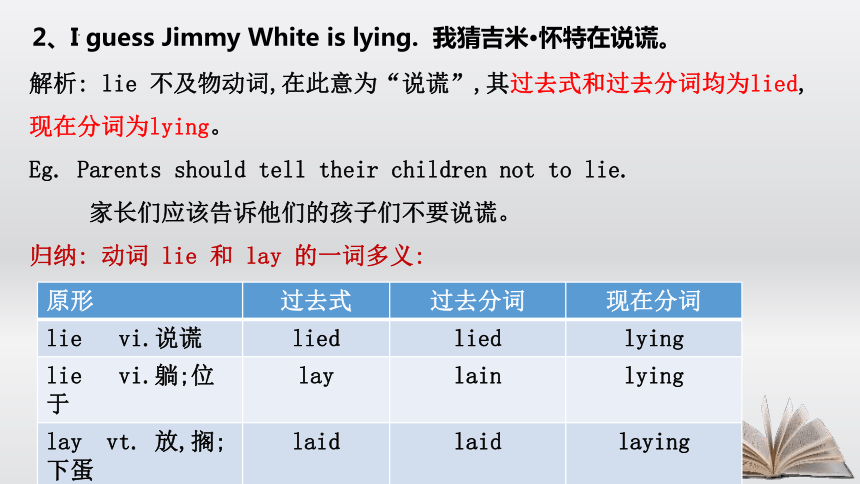
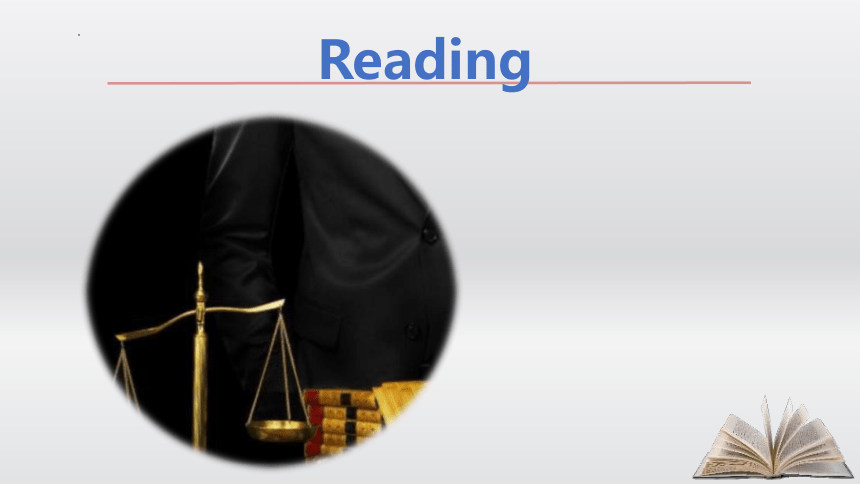

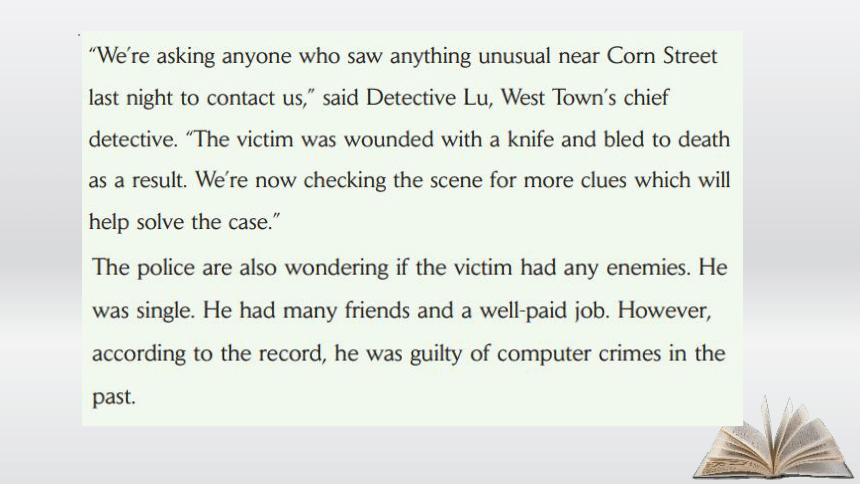
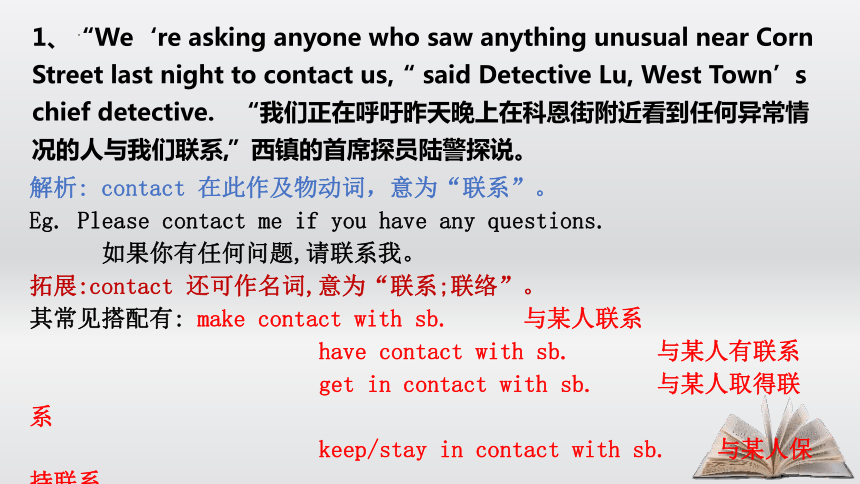
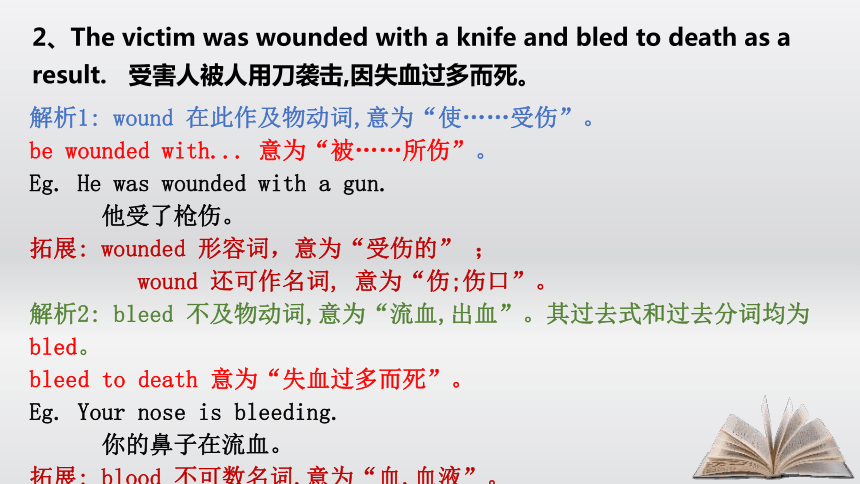
文档简介
(共33张PPT)
Unit 8
Detective stories
By : Sally
Welcome to the unit
1、of medium height and untidy 中等身材,邋遢
解析: medium 形容词,意为“中等的”,可作表语或定语,修饰大小、水平、数量。
其常见搭配为:(be) of medium height/length/ build“中等身高/长度/身材”
eg. What size shirt do you wear-small, medium or large
你穿多大尺码的衬衫小号、中号还是大号
The actor is of medium height.
那个男演员中等身高。
2、I guess Jimmy White is lying. 我猜吉米·怀特在说谎。
解析: lie 不及物动词,在此意为“说谎”,其过去式和过去分词均为lied,现在分词为lying。
Eg. Parents should tell their children not to lie.
家长们应该告诉他们的孩子们不要说谎。
归纳: 动词 lie 和 lay 的一词多义:
原形 过去式 过去分词 现在分词
lie vi.说谎 lied lied lying
lie vi.躺;位于 lay lain lying
lay vt. 放,搁;下蛋 laid laid laying
Reading
1、“We‘re asking anyone who saw anything unusual near Corn Street last night to contact us,“ said Detective Lu, West Town’s chief detective. “我们正在呼吁昨天晚上在科恩街附近看到任何异常情况的人与我们联系,”西镇的首席探员陆警探说。
解析: contact 在此作及物动词,意为“联系”。
Eg. Please contact me if you have any questions.
如果你有任何问题,请联系我。
拓展:contact 还可作名词,意为“联系;联络”。
其常见搭配有: make contact with sb. 与某人联系
have contact with sb. 与某人有联系
get in contact with sb. 与某人取得联系
keep/stay in contact with sb. 与某人保持联系
lose contact with sb. 与某人失去联系
2、The victim was wounded with a knife and bled to death as a result. 受害人被人用刀袭击,因失血过多而死。
解析1: wound 在此作及物动词,意为“使……受伤”。
be wounded with... 意为“被……所伤”。
Eg. He was wounded with a gun.
他受了枪伤。
拓展: wounded 形容词,意为“受伤的” ;
wound 还可作名词, 意为“伤;伤口”。
解析2: bleed 不及物动词,意为“流血,出血”。其过去式和过去分词均为 bled。
bleed to death 意为“失血过多而死”。
Eg. Your nose is bleeding.
你的鼻子在流血。
拓展: blood 不可数名词,意为“血,血液”。
3、"He was charged with breaking into several computer systems over the last year," said Detective Lu.“ 他被指控在去年一年中闯入数个电脑系统,”陆警探说。
解析1: be charged with...意为“被指控犯有…罪”, 其主动形式为: charge...with...“指控…犯有…罪”。其中charge是及物动词,意为“指控,控告”。
Eg. The police charged him with murder.
(=He was charged with murder by the police.)
警方指控他犯谋杀罪。
联想: be guilty of... 犯……罪
解析2: break into 意为“强行闯入”。其中into 是介词,其后要接宾语。
有关 break 的其他常见搭配: break out 爆发 break down 抛锚,出故障
break off 中断;突然停止(讲话等) break a record 打破纪录
break the silence 打破寂静 break sb. 's heart 使某人伤心(心碎)
4、 We suppose that the victim knew his murderer. 我们猜想受害人认识凶手。
解析: suppose 及物动词,意为“猜想,假定,料想”。
Eg. I don't suppose that he'll agree.
我猜他不会同意。
suppose的用法:
①“suppose + that 从句”表示“猜测……;认为……”,当主语为第一人称且主句是一般现在时时,若从句是否定形式,应将否定前移至主句,即“否定前移”。用法同guess、think、believe 等。
Eg. I don't suppose my friend can finish the work.
我猜想我的朋友不能完成这项工作。
4、 We suppose that the victim knew his murderer. 我们猜想受害人认识凶手。
② be supposed to do sth. 意为“理应做某事;应当做某事”;
be not supposed to do sth.意为“不可做某事;不许做某事”,在口语中表示委婉的禁止。
Eg. You are not supposed to smoke in this building.
你不可在这栋建筑物里吸烟。
③ suppose 可用于简略答语中,如I suppose so“我认为如此”和 I suppose not“我认为不这样”。
Grammar
限制性定语从句
1、关系代词的用法
关系词 先行词 用法 例句
who(m) 指人 who在从句中可以作主语或宾语;whom 在从句中作宾语,有时可用who 代替。 The girl who is dancing is my sister.
正在跳舞的那个女孩是我妹妹。(作主语)
That's the girl who (m) I met yesterday.
那就是我昨天遇见的那个女孩。(作宾语)
which 指物 在从句中可以作主语或宾语,作宾时可省略,位于介词后时除外。 This is a book which interests me.
这是一本让我感兴趣的书。(作主语)
The book which he bought yesterday is lost. 他昨天买的那本书丢了。(作宾语)
限制性定语从句
1、关系代词的用法
关系词 先行词 用法 例句
that 既指人也指物 指人时有时可用who 代替,指物时有时可用which 代替。在从句中可作主语、宾语或表语,作宾语时可省略。 A plane is a machine that can fly.
飞机是一种会飞的机器。(作主语)
The boy that I know studies best in his class. 我认识的那个男孩在他班上学习最好。(作宾语)
He doesn't seem to be the man that he was ten years ago.
他看起来已经不是10 年前的样子了。(作表语)
2、只能用that 不用which的情况
① 先行词是指物的不定代词时。
Eg. Is there anything that you don't know
你有不知道的事吗
②先行词被all、any、no、little、much等修饰时。
Eg. I want to read all the works that were written by Lu Xun.
我想阅读鲁迅的所有作品。
③先行词被序数词、形容词最高级修饰或先行词本身是序数词、形容词最高级时。
Eg. This is the second book that I borrowed from the school library.
这是我从校图书馆借的第二本书。
④ 先行词被 the only. the very. the last修饰时。
Eg. Chatting was the only thing that interested her.
聊天是她唯一感兴趣的事。
⑤先行词既有指人的名词又有指物的名词时。
Eg. We are talking about the people and things that we have seen in the countryside.
我们正在谈论我们在乡村见到的人和事。
⑥主句是以 which开头的特殊疑问句时。
Eg. Which is the bike that you lost
哪辆是你丢的自行车
注意:
① 关系代词在定语从句中作主语时,从句谓语动词的单复数形式需与先行词一致。先行词是单数时,从句的谓语动词用单数形式;先行词是复数时,从句的谓语动词用复数形式。
Eg. Guilin is a city which/that has a history of over 2,000 years.
桂林是一座有2,000多年历史的城市。(定语从句中的谓语动词 has 根据 a city 而定)
② 在定语从句中已经有关系代词作宾语或主语了,定语从句中就不能再出现相应的宾语或主语。
Eg. I will go to the museum that I visited it last year.
我要去我去年参观过的那个博物馆。(应去掉 it)
My aunt who she works in a hospital gave me a present.
我的那位在医院工作的阿姨给了我一件礼物。(she 多余)
1、 Well, it turned out that he had nothing to do with this case.
哦,事实证明他跟这个案子没什么关系。
解析: turn out 意为“原来是,结果是”,后面可接形容词、副词、动词不定式或that从句。
Eg. It was a difficult time, but finally things turned out well.
那是个困难时期,但最后还是好起来了。
The lady with glasses turned out to be her teacher.
那位戴眼镜的女士原来是她的老师。
关于 turn 的其他常见短语: turn off 关闭,关掉 turn on 打开,启动
turn up 出现;调高(音量等) turn down 拒绝;调低(音量等)
turn over 移交给 turn round 转身 turn in 上交
turn to sb. for help 去向某人求助
Skills&Task
1、 Bruce gets along with all of his neighbours except the man who lives next door. 除了住在隔壁的那个男人之外,布鲁斯和所有邻居都相处和睦。
解析1: get along with sb. (=get on with sb.)意为“与某人和睦相处”。
Eg. Can you get along/on with him
你和他能和睦相处吗
注意: ①表达“相处得好/不好”,应在with前加well/badly.
Eg. They get along well with each other.
他们彼此相处得很好。
联想: get along/on with sth. 在……方面取得进展
Eg. How are you getting along with your work
你的工作进展如何
1、 Bruce gets along with all of his neighbours except the man who lives next door. 除了住在隔壁的那个男人之外,布鲁斯和所有邻居都相处和睦。
解析2: except 介词,意为“除了……以外”。
Eg. All of them went to Shanghai except me.
除我之外,他们都去上海了。
辨析:except , besides
except 意为“除了……以外”,强调不包括所排除的,一般表示同类之间的关系,含有“减去”的意思。
besides 意为“除了……之外(还有……)”,强调包括 besides 后面的宾语,有“加上”的意思。
Eg. Everyone is here except Wang Ming.
除王鸣外大家都到了。(说明Wang Ming 没到,排除在外)
Another two boys were there besides Li Xiao.
除李晓外,还有两个男孩在那里。(说明Li Xiao也在那里,包含在内)
注意:当except、besides、including、 but、 with、as well as等连接名词或代词作主语时,谓语动词的人称和数通常与这些词前的名词或代词的人称和数保持一致。
Eg. All but one were here just now.
除了一个人外,所有人刚才都在这儿。
Thank you!
Unit 8
Detective stories
By : Sally
Welcome to the unit
1、of medium height and untidy 中等身材,邋遢
解析: medium 形容词,意为“中等的”,可作表语或定语,修饰大小、水平、数量。
其常见搭配为:(be) of medium height/length/ build“中等身高/长度/身材”
eg. What size shirt do you wear-small, medium or large
你穿多大尺码的衬衫小号、中号还是大号
The actor is of medium height.
那个男演员中等身高。
2、I guess Jimmy White is lying. 我猜吉米·怀特在说谎。
解析: lie 不及物动词,在此意为“说谎”,其过去式和过去分词均为lied,现在分词为lying。
Eg. Parents should tell their children not to lie.
家长们应该告诉他们的孩子们不要说谎。
归纳: 动词 lie 和 lay 的一词多义:
原形 过去式 过去分词 现在分词
lie vi.说谎 lied lied lying
lie vi.躺;位于 lay lain lying
lay vt. 放,搁;下蛋 laid laid laying
Reading
1、“We‘re asking anyone who saw anything unusual near Corn Street last night to contact us,“ said Detective Lu, West Town’s chief detective. “我们正在呼吁昨天晚上在科恩街附近看到任何异常情况的人与我们联系,”西镇的首席探员陆警探说。
解析: contact 在此作及物动词,意为“联系”。
Eg. Please contact me if you have any questions.
如果你有任何问题,请联系我。
拓展:contact 还可作名词,意为“联系;联络”。
其常见搭配有: make contact with sb. 与某人联系
have contact with sb. 与某人有联系
get in contact with sb. 与某人取得联系
keep/stay in contact with sb. 与某人保持联系
lose contact with sb. 与某人失去联系
2、The victim was wounded with a knife and bled to death as a result. 受害人被人用刀袭击,因失血过多而死。
解析1: wound 在此作及物动词,意为“使……受伤”。
be wounded with... 意为“被……所伤”。
Eg. He was wounded with a gun.
他受了枪伤。
拓展: wounded 形容词,意为“受伤的” ;
wound 还可作名词, 意为“伤;伤口”。
解析2: bleed 不及物动词,意为“流血,出血”。其过去式和过去分词均为 bled。
bleed to death 意为“失血过多而死”。
Eg. Your nose is bleeding.
你的鼻子在流血。
拓展: blood 不可数名词,意为“血,血液”。
3、"He was charged with breaking into several computer systems over the last year," said Detective Lu.“ 他被指控在去年一年中闯入数个电脑系统,”陆警探说。
解析1: be charged with...意为“被指控犯有…罪”, 其主动形式为: charge...with...“指控…犯有…罪”。其中charge是及物动词,意为“指控,控告”。
Eg. The police charged him with murder.
(=He was charged with murder by the police.)
警方指控他犯谋杀罪。
联想: be guilty of... 犯……罪
解析2: break into 意为“强行闯入”。其中into 是介词,其后要接宾语。
有关 break 的其他常见搭配: break out 爆发 break down 抛锚,出故障
break off 中断;突然停止(讲话等) break a record 打破纪录
break the silence 打破寂静 break sb. 's heart 使某人伤心(心碎)
4、 We suppose that the victim knew his murderer. 我们猜想受害人认识凶手。
解析: suppose 及物动词,意为“猜想,假定,料想”。
Eg. I don't suppose that he'll agree.
我猜他不会同意。
suppose的用法:
①“suppose + that 从句”表示“猜测……;认为……”,当主语为第一人称且主句是一般现在时时,若从句是否定形式,应将否定前移至主句,即“否定前移”。用法同guess、think、believe 等。
Eg. I don't suppose my friend can finish the work.
我猜想我的朋友不能完成这项工作。
4、 We suppose that the victim knew his murderer. 我们猜想受害人认识凶手。
② be supposed to do sth. 意为“理应做某事;应当做某事”;
be not supposed to do sth.意为“不可做某事;不许做某事”,在口语中表示委婉的禁止。
Eg. You are not supposed to smoke in this building.
你不可在这栋建筑物里吸烟。
③ suppose 可用于简略答语中,如I suppose so“我认为如此”和 I suppose not“我认为不这样”。
Grammar
限制性定语从句
1、关系代词的用法
关系词 先行词 用法 例句
who(m) 指人 who在从句中可以作主语或宾语;whom 在从句中作宾语,有时可用who 代替。 The girl who is dancing is my sister.
正在跳舞的那个女孩是我妹妹。(作主语)
That's the girl who (m) I met yesterday.
那就是我昨天遇见的那个女孩。(作宾语)
which 指物 在从句中可以作主语或宾语,作宾时可省略,位于介词后时除外。 This is a book which interests me.
这是一本让我感兴趣的书。(作主语)
The book which he bought yesterday is lost. 他昨天买的那本书丢了。(作宾语)
限制性定语从句
1、关系代词的用法
关系词 先行词 用法 例句
that 既指人也指物 指人时有时可用who 代替,指物时有时可用which 代替。在从句中可作主语、宾语或表语,作宾语时可省略。 A plane is a machine that can fly.
飞机是一种会飞的机器。(作主语)
The boy that I know studies best in his class. 我认识的那个男孩在他班上学习最好。(作宾语)
He doesn't seem to be the man that he was ten years ago.
他看起来已经不是10 年前的样子了。(作表语)
2、只能用that 不用which的情况
① 先行词是指物的不定代词时。
Eg. Is there anything that you don't know
你有不知道的事吗
②先行词被all、any、no、little、much等修饰时。
Eg. I want to read all the works that were written by Lu Xun.
我想阅读鲁迅的所有作品。
③先行词被序数词、形容词最高级修饰或先行词本身是序数词、形容词最高级时。
Eg. This is the second book that I borrowed from the school library.
这是我从校图书馆借的第二本书。
④ 先行词被 the only. the very. the last修饰时。
Eg. Chatting was the only thing that interested her.
聊天是她唯一感兴趣的事。
⑤先行词既有指人的名词又有指物的名词时。
Eg. We are talking about the people and things that we have seen in the countryside.
我们正在谈论我们在乡村见到的人和事。
⑥主句是以 which开头的特殊疑问句时。
Eg. Which is the bike that you lost
哪辆是你丢的自行车
注意:
① 关系代词在定语从句中作主语时,从句谓语动词的单复数形式需与先行词一致。先行词是单数时,从句的谓语动词用单数形式;先行词是复数时,从句的谓语动词用复数形式。
Eg. Guilin is a city which/that has a history of over 2,000 years.
桂林是一座有2,000多年历史的城市。(定语从句中的谓语动词 has 根据 a city 而定)
② 在定语从句中已经有关系代词作宾语或主语了,定语从句中就不能再出现相应的宾语或主语。
Eg. I will go to the museum that I visited it last year.
我要去我去年参观过的那个博物馆。(应去掉 it)
My aunt who she works in a hospital gave me a present.
我的那位在医院工作的阿姨给了我一件礼物。(she 多余)
1、 Well, it turned out that he had nothing to do with this case.
哦,事实证明他跟这个案子没什么关系。
解析: turn out 意为“原来是,结果是”,后面可接形容词、副词、动词不定式或that从句。
Eg. It was a difficult time, but finally things turned out well.
那是个困难时期,但最后还是好起来了。
The lady with glasses turned out to be her teacher.
那位戴眼镜的女士原来是她的老师。
关于 turn 的其他常见短语: turn off 关闭,关掉 turn on 打开,启动
turn up 出现;调高(音量等) turn down 拒绝;调低(音量等)
turn over 移交给 turn round 转身 turn in 上交
turn to sb. for help 去向某人求助
Skills&Task
1、 Bruce gets along with all of his neighbours except the man who lives next door. 除了住在隔壁的那个男人之外,布鲁斯和所有邻居都相处和睦。
解析1: get along with sb. (=get on with sb.)意为“与某人和睦相处”。
Eg. Can you get along/on with him
你和他能和睦相处吗
注意: ①表达“相处得好/不好”,应在with前加well/badly.
Eg. They get along well with each other.
他们彼此相处得很好。
联想: get along/on with sth. 在……方面取得进展
Eg. How are you getting along with your work
你的工作进展如何
1、 Bruce gets along with all of his neighbours except the man who lives next door. 除了住在隔壁的那个男人之外,布鲁斯和所有邻居都相处和睦。
解析2: except 介词,意为“除了……以外”。
Eg. All of them went to Shanghai except me.
除我之外,他们都去上海了。
辨析:except , besides
except 意为“除了……以外”,强调不包括所排除的,一般表示同类之间的关系,含有“减去”的意思。
besides 意为“除了……之外(还有……)”,强调包括 besides 后面的宾语,有“加上”的意思。
Eg. Everyone is here except Wang Ming.
除王鸣外大家都到了。(说明Wang Ming 没到,排除在外)
Another two boys were there besides Li Xiao.
除李晓外,还有两个男孩在那里。(说明Li Xiao也在那里,包含在内)
注意:当except、besides、including、 but、 with、as well as等连接名词或代词作主语时,谓语动词的人称和数通常与这些词前的名词或代词的人称和数保持一致。
Eg. All but one were here just now.
除了一个人外,所有人刚才都在这儿。
Thank you!
